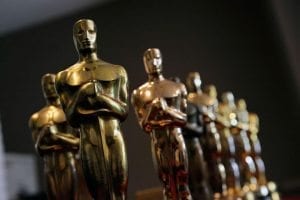Megyn Kelly Is Like A Drunk At A Dartboard When It Comes To Her Oscars Griping
I can’t say I usually agree with former Fox News outrage mannequin Megyn Kelly, but like a drunk at a dartboard, sometimes even though her aim is off, she hits the target.
This can be seen in her latest tirade throwing red meat to the zombies looking for something to be angry about, in which she ripped  on Sunday night’s Oscars ceremony and its skunky ratings, saying that the Academy Awards’ poor viewership numbers were because they were overly “woke.”
on Sunday night’s Oscars ceremony and its skunky ratings, saying that the Academy Awards’ poor viewership numbers were because they were overly “woke.”
“How’s all that incessant, insufferable woke, depressing lecturing via film, interviews, social media & at the actual, awful awards show going, Hollywood?” Kelly tweeted Monday morning, in a word pizza.
And, like a pizza with too many ingredients, some of her points were good, and others were best picked off and discarded.
Now, as regular readers know, I am certainly no fan of political correctness, as it’s called on the left, and “traditional values” posturing, as it’s called on the right. It’s the same pandering, pearl-clutching repression under a different color umbrella to whip up support among the extremes of both sides. I find most of it ridiculous and tiresome at the very least, and at most dangerously close to subverting the intent of the first amendment. I am a fan of common sense, and logic, both of which can be utilized in most circumstances to neutralize PC/TV outrage by both the right and the left. I’ve written about Dr. Seuss, and Lil Nas X, and other “earth-shattering controversies” which could easily be put into perspective if people on the extremes of the right and left would just take a few deep breaths and think about things before flying into a tizzy.

The Oscar ceremony saw a precipitous dip in ratings this year. Probably because Adam Sandler and his crew didn’t get any nominations for “The Wrong Missy.”
A lot of people are just looking for things to be ticked off about, in large part because that outrage gets them attention and interaction, and in a world — particularly an online world — where we’re becoming increasingly isolated, dehumanized, and drained of genuine connection and emotion, even rousing anger can seem preferable to the void of complete disinterest and disconnection.
That subconscious drive to connect even through clashing can be, and is, exploited for financial gain. Both Fox and MSNBC fall into predictable patterns of stoking outrage to increase their dwindling fan bases, in order to gain viewership, ratings, and advertising dollars. Without a Trump tweet or a Biden speaking gaffe of the day, they’ve got to stretch to make that happen. Hence, The War on Christmas, and The Battle For The Soul of Potato Head.
But what all these rushes to outrage commonly lack is perspective.
Perspective on the bigger picture, and context, of the subject they’re tackling.
And that’s precisely what Kelly’s attack on the Oscars is lacking in the big picture. She kinda sorta hits around the target, but her desire to exploit the current outrage machine to get her attention dilutes the germane aspects of her statement.
For Kelly to accuse the Oscars’ current lack of viewers on being suddenly overly woke is to ignore decades of the Academy Awards being likewise “woke” before the terminology was even a thing. It’s become a cliche to talk about celebrities going onstage brandishing pet causes,

Be honest: How many of these movies have you actually seen? Now, also be honest: How many times have you binge watched serial killer documentaries this past year?
going back to the 1960s and early ’70s when we saw things like Marlon Brando sending Sacheen Littlefeather onstage to refuse his Oscar for “The Godfather” over the mistreatment of Native Americans and their lack of representation in Hollywood. Hollywood’s commitment to causes is nothing new at all, and has been a common theme throughout pretty much every Oscars ceremony, most of which have been highly rated.
But some of which haven’t.
And the reason why this year’s Academy Awards got crappy ratings can be found, in part, in the same reasons previous shows had ratings dips — BECAUSE HARDLY ANYONE SAW THE MOVIES THAT WERE NOMINATED.
There is one common thread throughout the history of Academy Awards TV ratings — if there are big, blockbuster movies nominated, the ceremony gets much bigger ratings because people are familiar with the nominees and they cheer for the films they’ve actually seen and liked. If the movies aren’t big hits, if they’re indie flicks that hardly anyone across the vast majority of the public has seen, then people don’t care because they don’t really feel invested in the competition. It’s like me discussing who’s going to win the Champions League with most Americans. “Nomadland” might as well be Manchester City.
But don’t just trust me on this, let’s look at actual facts and numbers. You know, those things people like to ignore when they’re riling people up with ridiculous bullshit? Here’s a couple paragraphs with various citations from the Wikipedia page for Academy Awards show ratings:
“Historically, the telecast’s viewership is higher when box-office hits are favored to win the Best Picture award. More than 57.25 million viewers tuned to the telecast for the 70th Academy Awards in 1998, the year of Titanic, which generated a box office haul during its initial 1997–98 run of US$600.8 million in the US, a box office record that would remain unsurpassed for years. The 76th Academy Awards ceremony, in which The Lord of the Rings: The Return of the King (pre-telecast box office earnings of US$368 million) received 11 Awards

Cinemark movie theaters across the country were closed down for most of 2020, making it much more difficult for people to see and become invested in films.
including Best Picture, drew 43.56 million viewers. The most watched ceremony based on Nielsen ratings to date, however, was the 42nd Academy Awards (Best Picture Midnight Cowboy) which drew a 43.4% household rating on April 7, 1970.
“By contrast, ceremonies honoring films that have not performed well at the box office tend to show weaker ratings, despite how much critically acclaimed those films have been. The 78th Academy Awards which awarded low-budget independent film Crash (with a pre-Oscar gross of US$53.4 million) generated an audience of 38.64 million with a household rating of 22.91%. In 2008, the 80th Academy Awards telecast was watched by 31.76 million viewers on average with an 18.66% household rating, the lowest-rated and least-watched ceremony at the time, in spite of celebrating 80 years of the Academy Awards. The Best Picture winner of that particular ceremony was another independent film (No Country for Old Men).”
Hmmm.
So, let’s try this again. Why were this year’s awards so poorly rated?
Because hardly anyone saw the movies nominated for the major awards, and that’s in part because ALL OF THE MOVIE THEATERS ACROSS THE COUNTRY WERE CLOSED DOWN DUE TO COVID.
Sure, people could watch films from their own homes, but it’s an entirely different experience when you’re renting those films through Amazon Prime, and they’re not getting anywhere near as much publicity or advertising promoting them, there’s not as much word-of-mouth, and they’re competing against other films and entertainment which are far more flashy and attention-grabbing.
Show of hands, how many of you just flipped by “Nomadland” on the Hulu list because you didn’t even know it was a movie? You didn’t even know what it was? Well, my hand is up, at least. The first few times I scrolled by it, I had no idea it was a major motion picture that came out

Trust me, if there had been a Tiger King movie nominated for an Oscar, people would’ve been intrigued. Especially if it was competing against a movie made by that bitch Carole Baskin!
this year. I just thought it was yet another show or something that Hulu was pushing and it didn’t make an immediate impression with me. It wasn’t until later, when I read our film critic Tim Brennan’s review that I even knew it was a current film.
In addition, over the past year of the pandemic, people have trended towards escapist fare that could take their minds off the crappy residue of life under covid. They didn’t avoid these films because they were woke, they avoided them because they were serious dramas (read: depressing), which is where Kelly was kinda right in her word pizza. When I first saw the “Nomadland” promo, I thought, “Well, that looks serious and depressing… and I’ve already had a long, draining day… let’s watch ‘Seinfeld’ reruns!”
I’m definitely not alone. “Tiger King,” “The Last Dance,” “Cobra Kai,” and other pop candy has been at the top of the charts over the past year. Many pop cultural commentators, myself included, have pointed out that the absurdity and hilarity of “Tiger King” was in part tremendously resonant with people because we were at the beginning of a frightening and strange time entering a global pandemic.
Serious-minded stuff like “Nomadland” has seemed like eating steamed broccoli when you just want to get some tacos. It’s not because it’s woke, it’s because it just seems like too much mental work to digest and maybe hits too close to home in a time when it’s already depressing enough living through a pandemic.

“Nomadland” won the Oscar for Best Picture this year. How many people actually saw it?
This year’s Oscar nominees were a decidedly somber bunch. There was no “Titanic,” or “Lord of the Rings,” or even a big hit rivalry like “Pulp Fiction” vs. “Forrest Gump.”
There were just a lot of well-made, highly-crafted, quality films on serious topics.
Kind of like other “serious” films that saw a “crash” in Academy Awards ratings. (See what I did there? Thank you, thank you. Please tip your waitstaff.)
So for Megyn Kelly and others to blame the ratings plummet on “woke culture” is largely inaccurate. Yes, there’s a small kernel of truth in that the seriousness of “woke culture” follows the same path as other serious topics in films which dampen viewership. But it’s nothing new, it’s nothing as simple as that, and it’s part of a much bigger overarching trend. One which could be easily reversed next year if the theaters open up and 2021 sees a bigger array of huge box office hits that end up getting nominated.
If Kelly really wanted to say something more incisive and insightful, she would’ve taken aim at why the Oscars doesn’t respect and laud the talents and achievements inherent in genre films (action, comedy, etc.), leaving creators to constantly turn to depressing and somber films in order to gain any critical and awards recognition.
But then again, much like the filmmakers pushing dramas to woo Academy voters, she’s got to create content to appeal to her audience as well.









